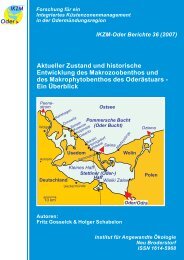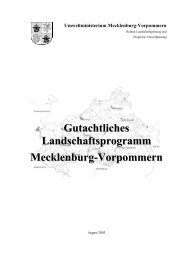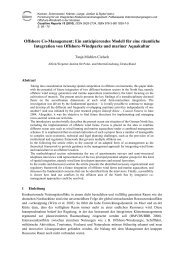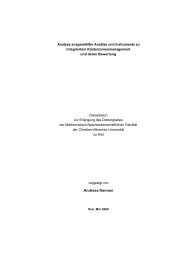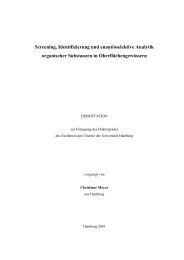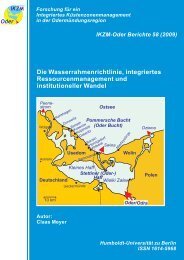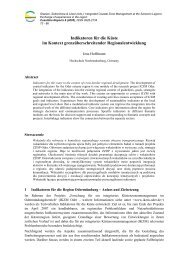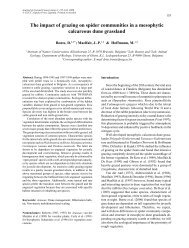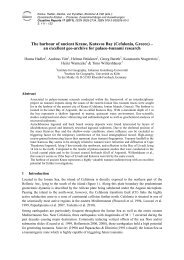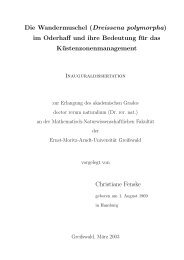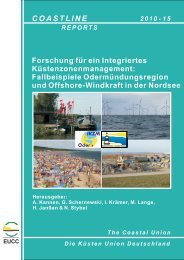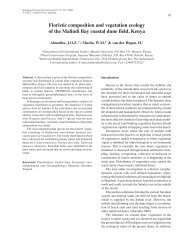Indikatoren für ein Integriertes Küstenzonenmanagement
Indikatoren für ein Integriertes Küstenzonenmanagement
Indikatoren für ein Integriertes Küstenzonenmanagement
Sie wollen auch ein ePaper? Erhöhen Sie die Reichweite Ihrer Titel.
YUMPU macht aus Druck-PDFs automatisch weboptimierte ePaper, die Google liebt.
ICOM – Integrated Coastal and Ocean Management: “… is a continuous and dynamic process<br />
which takes into account ecological, economic and social considerations and employs a comprehensive<br />
method of planning and managing human activities in ocean and costal areas.” (IOC 2005: 17)<br />
Alle drei Ansätze (ICZM, ICAM, ICOM) können als nahezu identisch angesehen werden. Selbst das<br />
ICOM, das aufgrund des Bezugs zu Ozeanen <strong>ein</strong>en anderen Hintergrund erwarten ließe, nähert sich<br />
dem IKZM durch die Beschreibung s<strong>ein</strong>es Bezugsraums wieder an: „The geographic scope of a coastal<br />
or ocean management area can be either small or large, covering whole ecosystems or portions<br />
of an ecosystem. Small management areas may consist of an embayment or estuary, while larger<br />
coastal areas may include both the land and nearshore waters of a coastal province. Larger ocean<br />
management areas could include whole territorial seas up to the 200-mile limit of the Economic Exclusive<br />
Zone …” (IOC 2005: 17)<br />
In Verbindung mit IKZM steht auch der Begriff des ICARM – Integrated Coastal Area and River<br />
Basin Management. ICARM verbindet den Ansatz des Flussgebietsmanagements mit dem des <strong>Küstenzonenmanagement</strong>s<br />
vor dem Hintergrund der großen Be<strong>ein</strong>flussungen, die durch in Küstengewässer<br />
<strong>ein</strong>mündende Flüsse gegeben sind. „An Integrated Management of River-basin and Coastal Area<br />
(ICARM) builds on the good practices of Integrated Water Resources Management (IWRM) and Integrated<br />
Coastal Zone Management (ICZM), the focus of the ICARM should be on the missing link<br />
fort he shared issues.” (Guidance on ICARM)<br />
Zusammenfassend kann gesagt werden, dass alle drei Ansätze sich den Problemen der Küstenregionen<br />
widmen und sich somit auch die dabei verwandten <strong>Indikatoren</strong> <strong>für</strong> <strong>ein</strong> IKZM nutzbar machen lassen.<br />
Forderungen nach <strong>Indikatoren</strong><br />
In Verbindung mit Steuerungsansätzen wie <strong>ein</strong>em IKZM steht auch die Frage nach der Überprüfung<br />
der durch die Intervention ausgelösten Effekte. Auf <strong>ein</strong>em Treffen im Jahre 1996 der GESAMP (International<br />
Group of Experts on the Scientific Aspects of Marine Environmental Protection) wurde<br />
folgendes vorrangiges Ziel identifiziert: „There is an urgent need for an accepted integrated coastal<br />
management (ICM) evaluation methodology. … When an evaluation framework is in place it will be<br />
possible to document trends, identify their likely causes and objectively estimate the relative contributions<br />
of ICM programs to observed social and environmental change.” (Olsen, Lowry, Tobey 1999: 1)<br />
Von internationalen Organisationen (UNEP, FAO, EU) <strong>für</strong> IKZM entwickelte Handbücher haben die<br />
Bedeutung von <strong>Indikatoren</strong> <strong>für</strong> die Beobachtung von Veränderungen des Zustandes der marinen Umwelt,<br />
<strong>für</strong> die Bewertung von Trends sozio-ökonomischer Belastungen und Bedingungen in Küstengebieten<br />
sowie die Bestimmung der Effektivität von IKZM-Aktivitäten im Verhältnis zu dabei angestrebten<br />
Zielen hervorgehoben. („Most international guidelines for ICM call for the use of indicators<br />
to monitor the state of the coastal zones and assess the performance of ICM efforts.” IOC 2003: 7)<br />
Sowohl die wissenschaftliche Literatur als auch die praktischen Erfahrungen in diesem Feld haben<br />
den Weg in Richtung <strong>ein</strong>er Entwicklung von <strong>Indikatoren</strong> gewiesen. (IOC 2003: VII). Zur Bedeutung<br />
von <strong>Indikatoren</strong> äußerte sich die Intergovernmental Oceanographic Commission (IOC) folgendermaßen:<br />
„Indicators can provide an extremely useful way to improve communication, transparency,<br />
effectiveness and accountability in integrated coastal management. They are a tools that can be used<br />
to clarify assessments of, and comparisons between, management programs through time. More im-<br />
51



